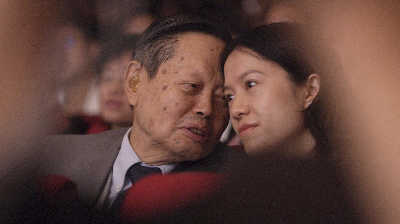|
Scholars need money, time to get Nobel Prize
(Shanghai Daily)
Updated: 2005-10-24 09:23
Though China has never won a Nobel Prize, the nation has most of the key
elements to win - what it needs is more support for elite scholars.

Chinese-American Nobel Prize laureate
Chen-ning Yang whispers to his wife Weng Fan during his lecture entitled
"My Life" at Jiao Tong University in Shanghai, October 23, 2005. [East
Morning Post] |
That's the view of
Chinese-American Nobel Prize laureate Chen-ning Yang, who delivered a lecture on
success in Shanghai yesterday.
China needs to increase its welfare and benefits for elite researchers who
are likely to compete for a Nobel, he said.
Overseas Chinese have been awarded Nobel prizes, but never a resident of the
mainland, Hong Kong or Taiwan.
Yang, 83, delivered a lecture entitled "My Life" at Jiao Tong University's
Minhang campus. About 1,800 students attended.
The lecture was part of a celebration of Jiao Tong's upcoming 110th
anniversary next year.
Born in Hefei, Anhui Province, in 1922, Yang left the country for a doctoral
degree at University of Chicago in 1945. He then joined the Institute for
Advanced Studies at Princeton University. In 1957, he won the Nobel Prize in
physics, together with another Chinese-American, Tsung-Dao Lee in 1957.
In a case of good chemistry, the renowned physicist married Weng Fan, a
28-year-old graduate student at Shantou, Guangdong Province, last December.
Speaking about essential qualities for a Nobel Prize winner, Yang said that
China has three of the four key factors to win the world's top scientific award
- bright young men and women, a cultural tradition of hard work and diligence,
and a strong determination to succeed.
The only thing that Chinese scholars are missing is money - financial
support, welfare benefits and time to devote to science.
"Payments and welfare for Chinese scholars have been raised significantly in
recent years, but that is still not enough," Yang said. "Better welfare is still
needed to exempt them from daily life trifles and routine work in order to
concentrate on their research."
Before taking a university entrance exam, Yang said he knew nothing about
physics. But reading a physics book for a month to prepare for the exam drew him
to physics.
"I am fortunate to have chosen an area that is both my interest and also has
bright development prospects," said Yang.
In 1949, Yang and four other young men raised US$17 to enter a crossword
puzzle contest, aiming for the US$50,000 first-prize award.
As he toiled, he read The New York Times - Japanese physicist Yugawa Hideki
won the 1949 Nobel Prize. He was awakened.
|